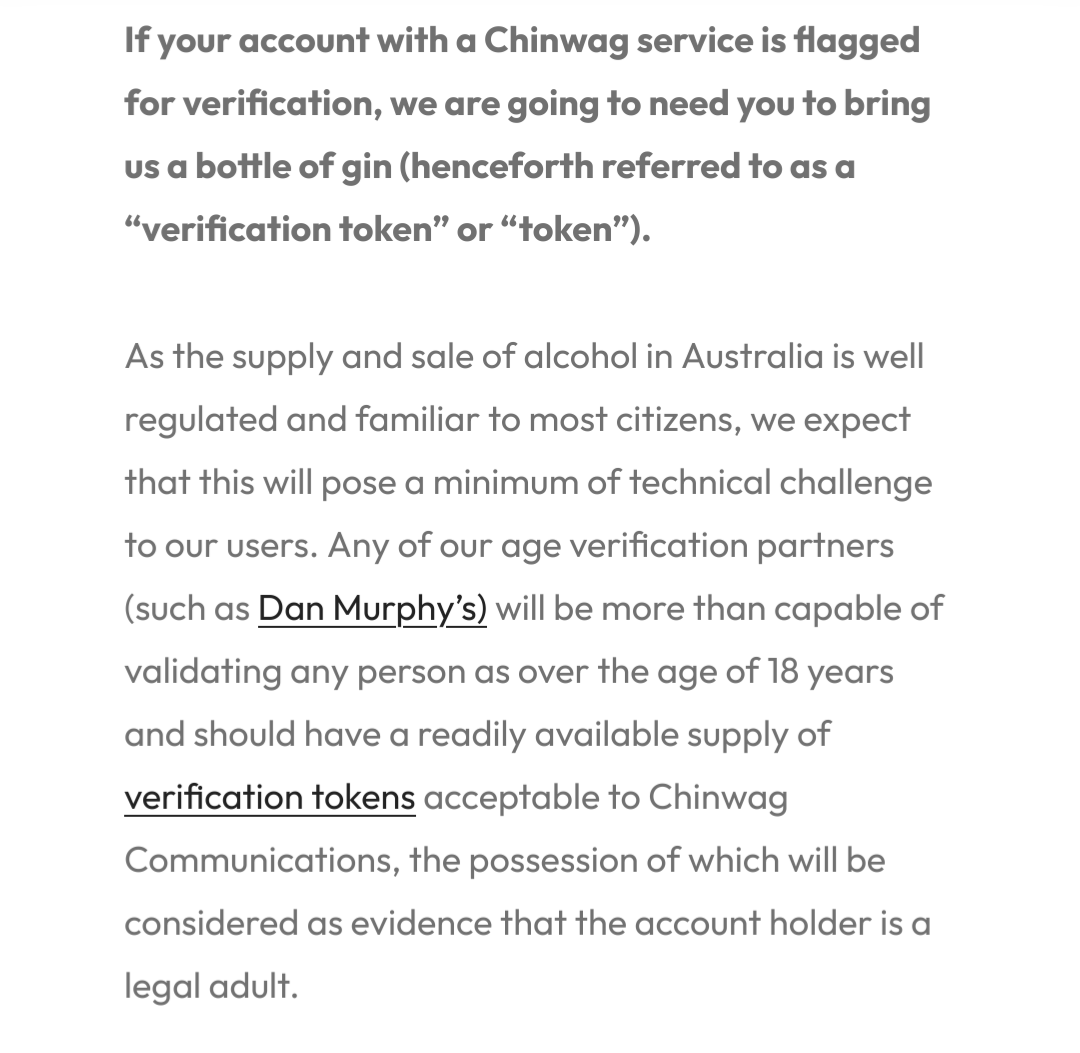To be extremely clear: the Government announced that this was an enormous priority that had to be rushed through. They introduced it last Thursday, closed submissions on Friday, and held the inquiry on Monday. Then it was passed by the House on Wednesday and the Senate had a grand total of 1 hour to debate amendments to it on Thursday.
All this incredible haste and lack of due process for a Bill that will not take effect for at least a year. It’s optics, pure and simple.
Well done to the Greens, independents, and LNP Senators Canavan and Antic for having some fucking integrity. Regardless of whether the Bill itself may have ended up being agreed to, the process by which it was passed is inexcusable.
And apparently didn’t process, read or hear the vast majority of the thousands of submissions received on one day notice. So they asked for submissions and ignored them.
Winding back democratic participation unfortunately seems to be common ground between the ALP and most of the LNP. Hopefully we see a swing away from those parties at the upcoming election.
Here are some of the things that were proposed as amendments to this Bill, that the Labor and LNP uniparty voted down.
The Minister must, by legislative instrument, formulate guidelines for the taking of reasonable steps to prevent age-restricted users having accounts with age-restricted social media platforms
In other words, before the Bill actually comes into effect, there need to be some guidelines about what the fuck it actually means. But apparently Labor and most of the LNP (Canavan—who moved this amendment—and Antic aside) don’t think guidelines matter.
the Minister must be satisfied that the legislative rules would not have the effect, or be likely to have the effect, of substantially lessening competition in the market for that kind of electronic service
Labor and the LNP are specifically aware that small guys…like us here on Lemmy…might be hit harder, and decided to vote not to make sure the rules prevent that from happening.
[Remove:] If an entity…uses or discloses the information otherwise than…with the consent of the individual…the use or disclosure of the information is taken to be an interference with the privacy of the individual
Ok I’ve summarised this one immensely because the way it’s laid out is very technical. I’m referring to amendment 3215 by Canavan if anyone wants to verify it.
But basically, Canavan (and Pocock, who moved a similar amendment) wanted to say “if you collect this data, you must only use it for verifying people’s age. Even if you get consent to use it for other reasons, you’re not allowed to.” This would have absolutely enshrined the protection against things like “oh but we put a tick box to get consent to use it for other purposes and they clicked it.”
Labor and the LNP didn’t want this.
an individual is not an age-restricted user if…a parent or guardian of the individual consents to the individual not being an age-restricted user
Yup. Parents are not legally allowed to declare that their children can use apps. Because Labor and the LNP voted this amendment down. Now, if a parent helps their child do it anyway, the parent and child can’t get in trouble, but the platform can, because platforms cannot knowingly allow children to use the app, even with explicit parental consent and supervision.
Jesus chriat they shoulda just slapped in one that said ‘this is about monitoring citizens’
If they were rushing through the bill then any amendments in the senate would require the bill to go back to the house. Partially explains the reluctance to consider amendments (though why bother with debate then).
Depressingly
The ban is, however, backed by 77% of Australians, according to a new poll.
Most of whom probably don’t care how it was passed or details on the amendments.
The bill was passed by the Senate after amendments. It had to go back to the House anyway. They just chose not to pass many of these quite common sense amendments raised by one of their own members (Matt Canavan), meaning they had plenty of time to consider their opinion and would have voted on it with that prior understanding in mind; they’re not being blindsided by something they have yet to have a chance to fully form an opinion on. The House received the Senate’s amended Bill and passed it within minutes.
Nevermind then. I wasn’t giving them much credit but it was still too much it seems.
Matt Canavan being the voice of reason was certainly not on my bingo card. Broken clocks and all of that.
Now, if a parent helps their child do it anyway, the parent and child can’t get in trouble, but the platform can, because platforms cannot knowingly allow children to use the app, even with explicit parental consent and supervisio
Not correct. An inadverdent act is not illegal, but circumventing telecommunication controls is a criminal offence under the Telecommunications Act, with penalties up to 20 years imprisonment.
No, this bill specifically only makes it possible to penalise the platforms. Parents or children cannot be penalised. The precise wording in the bill is:
A provider of an age-restricted social media platform must take reasonable steps to prevent age-restricted users having accounts with the age-restricted social media platform.
Civil penalty: 30,000 penalty units
There are also penalties that can apply to individuals, but only if:
the person is a provider of an age-restricted social media platform;
or
the person is a provider of an electronic service;
(To the penalty of “Civil penalty: 500 penalty units”.)
The likes of lemmy instances may be either small enough to fly under the radar, or handwaved away by legislators with “don’t worry it’s not the target of this legislation”, or even be given easy access to ministerial exemption …for now (maybe).
The kicker comes in 10-15 years’ time when, say, a government’s donor inconvenienced by protests organised using a self-hosted forum then asks the government to crack down on the age verification requirements of that forum, effectively silencing it due to the requirements being too onerous for a small forum, or the userbase being unwilling to submit their IDs/faceprints/whatever.
This may be the doomer in me, but I fear this will spell the end of Aussie.zone - Lemmy fits the definition of social media, but I don’t know how it’s feasible for @lodion to verify every user’s age…
Double this solution from chinwag. https://chinwag.au/verification/

That sounds pretty good. The problem is that getting the Gin to @lodion may be a bit tricky. Also the quality of server administration may not be to the same standard as they dispose of the Gin.
What about uploading a picture of the Dan Murphy checkout chick giving a thumbs up?
Just post it on Ginstagram
If that’s the case, we just all pack up and take over some British instance.
A little payback for the colonisation /s
A possible ban on social media for under-16s in the UK is “on the table”, the technology secretary Peter Kyle has told the BBC.
Ah shit
Watch out jlai.lu the aussies are comin!
I think leave it 6 months and look at what everyone else is doing. It’s too early to be freaking out, and without government guidance there’s no hope of working out what will and won’t count based on what the Aussies are saying in this post (including the article).
main reason for it - no anonymous account on social media for_everyone_. It just another surveillance imposing law.
main reason for it - no anonymous account on social media for_everyone_. It just another surveillance imposing law.
That’s the neat part
You can’t see it, but I have my dubious face on.
It’ll be interesting to see the definition of “social media”. All I’ve seen so far is a list of sites/services that will be banned/exempt.
Lemmy doesn’t seem to fit into such a law. Lock down a pile of sites running Lemmy, another instance pops up isn’t covered by the ban. “Ban Lemmy software, then” I hear you say. Thing is: Lemmy is open source. Someone can fork it, release a new federating service software called TotesNotLemmyLol on their site and get around the ban.
I genuinely can’t tell how the government will implement this.
I say this as a dad to a teenager who will be affected by this law, and no - I wouldn’t want him unsupervised on Lemmy. He’d be safe enough in Local (you guys are lovely), but it’s a dark world out there.
They won’t ban the site, they will just fine them for not verifying age (30,000 penalty units, 1 federal penalty unit is $110).
Lemmy does fit the definition outlined in the act, the thing they haven’t defined is what the reasonable steps will be to verify age. It will likely only apply to sites hosted or with a presence in Australia. Its not like they can fine an instance in a random country although maybe if it’s a jurisdiction that will play ball (maybe 5 eyes countries, maybe close trading partners).
I reckon this instance will be considered social media, I don’t really see how it wouldn’t be. I imagine even if you were to move this instance to a server outside of Australia, you both being Australians means you’ll still have to manage ID verification crap
I’m not so stoic, I think this probably will end up affecting all of us here
The act is online now. Lemmy is clearly defined as social media under Section 13a of the act.
Of course, I have no idea how we’ll comply with the act - there’s obviously no existing field or provision in the Lemmy Code to enter a private identifier as a user to confirm your age. We have a year to figure that out.
It’s also hilarious to imagine international instances complying. Imagine the scenario: Kyrgyzstan has passed a law that states that all its users must provide an ID to use aussie.zone. Are we going to comply with this law? How many of our users are Kyrgyz? That’s what this law appears to call for - asking our friends at lemmy.world (who are hosted in Finland) to comply with an Australian law because some of their users are Australian.
Called it. Good luck with that. I’ll be turning on a VPN when this comes into effect, or I’ll be jumping ship to that New Zealand instance. The Finnish are nice, but there’s too many yanks on LW and those general purpose instances. Though I’d consider that anarchist instance
@Nath lemmy.world need to buck their ideas up
Just my assumption, couldn’t answer that definitively. I’m guessing that, like GDPR in the EU, it will apply to any and all social media website on the internet, but for practical reasons, can’t really be enforced outside of the legislating authorities’ jurisdiction. I mean, Cuba, for instance, could fine you at any time if they had laws permitting for it, but if you’ve never been, and never intend to go to Cuba, it doesn’t really do very much
Going back to the real world, I’m doubtful foreign websites hosted outside of Australia, by non Australians, would ever be “prosecuted”, it’s just a huge waste of time. Maybe any countries we have close relationships with would do our dirty work for us. I assume that this would apply to any Australian or any Australian company or any Australian server. Just my non professional assumption though, could be totally wrong!
I’m guessing that, like GDPR in the EU, it will apply to any and all social media website on the internet, but for practical reasons, can’t really be enforced outside of the legislating authorities’ jurisdiction.
The legislation specifically gives the Act extra-territorial powers to enforce the ban against foreign websites.
Reddit is specifically targetted ; it will definitely include Lemmy.
One possibility is the Brazilian way to do law enforcement: blocking the domain and server IP addresses through ISPs.
Here in Brazil, a Supreme Court minister has ruled on several occasions to block certain websites and services, the most recent being X/Twitter. Along with his decision to block these websites, he also imposed fines on those caught using VPNs to bypass ISP blocking. Although VPN traffic is encrypted and impossible for governments to monitor, somehow this worked because several people were fined. It is likely that Supreme Court agents monitored these networks in order to detect possible Brazilians using them during such blockages. An Australian should expect their government to proceed in a similar fashion.
(Just for clarification, I’m not going into the merits of this, just stating that this is technically possible and that there is a precedent in the government of a country, in aforementioned case, Brazil. Whether this is good or bad will depend on many factors)
The bill does say what it covers:
Age-restricted social media platform (ARSMP) is defined at proposed section 63C. This section outlines the scope of the proposed obligation to be introduced, while also providing the Minister with flexibility to specify which platforms are or are not covered by the provisions through making legislative rules.
The definition of ARSMP draws on the existing definitions in the Act, in particular electronic service (section 5). This broad definition, with some exclusions, covers:
- a service that allows end‑users to access material using a carriage service
- a service that delivers material to persons having equipment appropriate for receiving that material, where the delivery of the service is by means of a carriage service.
Under proposed section 63C, an ARSMP would be an electronic service which satisfies the following conditions:
- the sole purpose, or a significant purpose, of the service is to enable online social interaction between 2 or more end-users[2]
- the service allows end-users to link to, or interact with, some or all of the other end-users
- the service allows end-users to post material on the service
- such other conditions (if any) as are set out in the legislative rules.
Further, the Explanatory Memorandum (EM) states that, ‘in the first instance’, the Government proposes to make legislative rules to exclude messaging apps, online gaming services and ‘[s]ervices with the primary purpose of supporting the health and education of end-users’ from the definition of ARSMPs
Broad as usual, but basically from my understanding any website thats primary purpose is user to user communication of some form, unless its a messaging, health, or gaming orientated service. Also the minister can directly exclude services as they see fit.
proposed subsections 63C(6) and (7) provide that the Minister may specify that a digital service is out of scope of the definition of ARSMP
How the system is actually going to work seems to be all up to the eSafety Commissioner and this bill seems to just to say, your job is to make this happen with XYZ requirements, and here are the penalties if someone doesn’t comply once it’s implemented.
Yep: I followed up yesterday when the act had been uploaded. It wasn’t online on Thursday when I made that comment. Or if it was online, Google hadn’t yet indexed it.
Not sure if the legislation is good or bad. Time will tell.
Two things are clear though. The large social media platforms are worth billions of dollars and can afford to self regulate. Also they extensively profile users to sell data and targeted advertising and serve targeted content that will keep people engaged (addicted).
I don’t know if they really need age verification when they know all your friends, interests and shopping habits. Their algorithms know you are an Australian teenager as that knowledge is their product.
Hopefully the fediverse and non profit sites don’t get caught up in this. Unfortunately our politicians have very low technical literacy.
Mediawatch showed something disturbing: Murdoch papers have been actively campaigning for the bill for the last six months. I wonder why? https://www.abc.net.au/mediawatch/episodes/teens/104644976
The legislation does note that some services are “excluded”, but does not name specific platforms. For example, while services providing “online social interaction” would be included in the ban, this would not include “online business interaction”.
Looking forward to watching Facebook claim it’s all a business interaction because they’re selling the user data or something. Also surely this includes any and all online forums.
@spiffmeister @Joker I’m interested in how they’ll handle iMessage. And if they allow iMessage, why not Signal? And so on. Gonna be some interesting lines have to be drawn.
I they’re going to need Mr. Squiggle to make those lines look like something coherent.
It then law is written loosely enough they may just try to apply it however is politically convenient at the time. Don’t like people using signal? Guess signal is social media lmao.
That’s not to say the original intent is to harass software they don’t like, but a law written ambiguously can be used for other things if desired.
@spiffmeister Sounds like I’ll be using BHPMail, MinResX and Riosky
Looking forward to watching Facebook claim it’s all a business interaction because they’re selling the user data or something.
Well there’s Marketplace which is quite popular, so maybe they can contort themselves to make that argument.
I don’t see it as a bad thing, if they ask me to verify my age via a driver’s license I’ll just delete my account, none of them are that important that I would give them a copy of my identification.
The legislation actually doesn’t allow them to require you to identify by sending them your licence. I think they’re allowed to request that as one of the options, but it cannot be the only one.
It sounds like the accepted options will probably be either facial recognition via third-party service (can’t wait to do that by pointing my phone at a video of a person on YouTube staring at the camera, like I did for a second backup Gmail account) or an official government age-verification service…which may or may not keep your identity from being tracked through the use of blinded tokens.
It’s a mystery for sure. They won’t even tell us what does or doesn’t count to plan accordingly
Everything the Center for Humane Technology has ever done should be mandatory reading, viewing and listening for anyone who attempts to insert themselves into the debate over this. It’s so tiring hearing completely uneducated morons from all sides making the same basic bitch arguments over and over again Hopefully now they can all shut the fuck up for five seconds and stop shitting up the discourse on what is a very important issue.
When was the last time that politics was concerned with that odd concept called “reality”?
How does China verify users on all their apps?
















